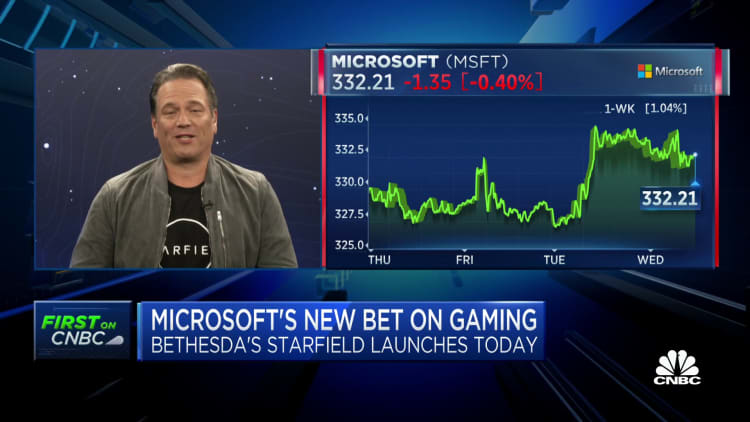Phil Spencer, CEO of Microsoft’s gaming unit, arrives at federal court in San Francisco on June 28, 2023.
Loren Elliott | Getty Images
Microsoft executives predicted gaming growth coming from advertising and mobile purchases over the next several years, according to a May 2022 presentation that was inadvertently published on a court website this week.
The disclosure is the latest bit of inside information to trickle out as a result of the software maker’s battle against the Federal Trade Commission over the pending Activision Blizzard acquisition. Earlier documents have shown Microsoft targeting $500 billion in total revenue by the 2030 fiscal year and analyzing its corporate clients’ use of products from its rivals.
A Tuesday order from a judge at the U.S. District Court for the Northern District of California said that on Sept. 7, the court asked the parties to submit redacted documents. Microsoft sent the link on Sept. 14, and the court uploaded the documents to its website. Then the parties told the court that the documents contained non-public information, and the court removed the documents from public view. District Judge Jacqueline Scott Corley directed the parties to submit documents once more and confirm that they only contain public information.
The presentation describes plans for a new Xbox console timed for a 2028 release. It would follow the Xbox Series X and Series S, which became available in 2020. Those consoles are the successor to the Xbox One, which debuted in 2013.
The document does not mention the $68.7 billion Activision deal, which had been announced months earlier. But Activision would seem to be a key to achieving the type of revenue described in the presentation.
It shows gaming revenue doubling to $36 billion in the 2030 fiscal year, compared with a forecast of $18 billion for the 2022 fiscal year. Actual fiscal 2022 gaming revenue totaled $16.23 billion, according to an annual report.
A Microsoft spokesperson did not immediately respond to a request for comment.
Completing the Activision deal would result in Microsoft expanding sales of transactions across consoles and PCs, and it might also draw more subscribers to its Game Pass library. Growth in those two categories are factored in to the fiscal 2030 forecast.
But faster growth is imagined in two more nascent categories: advertising and mobile transactions. Microsoft works with Yahoo to sell display ads for Xbox consoles, but they’re not pervasive.
Activision Blizzard in 2016 acquired King Digital Entertainment, the company behind the Candy Crush franchise of mobile games. Through that deal, Activision Blizzard gained revenue from in-app purchases and advertising. The King subsidiary gave Activision Blizzard $2.79 billion in revenue in 2022, up about 8%.
“Activision is really a mobile first publisher,” Phil Spencer, CEO of Microsoft’s gaming business, wrote in a 2020 email to finance chief Amy Hood and other executives that was included in the new document cache.
The 2022 presentation showed that Microsoft believed its advertising revenue would swell to $1.4 billion fiscal 2030 from about $100 million in fiscal 2022. And it indicated that management saw revenue from mobile transactions reaching $2.6 billion, compared with none in fiscal 2022. The total of the two categories is $4 billion, or 11% of total gaming revenue.
Microsoft is now looking to close the Activision transaction by Oct. 18. The United Kingdom’s Competition and Markets Authority is assessing a new proposal for the deal that would involve divesting to Ubisoft the cloud streaming rights to Activision games.
WATCH: Microsoft’s new bet on gaming: Bethesda’s Starfield launches today


